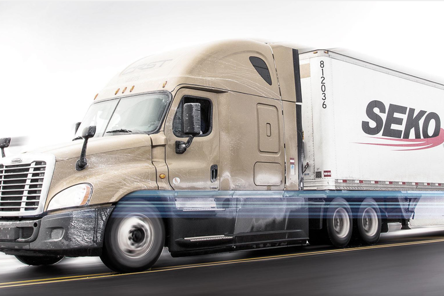Congratulations! Business must be booming if you’re looking to outsource your logistics. Partnering with a 3PL can have multiple benefits for your ecommerce business. With that being said, t can seem overwhelming at first glance. This guide will cover the key components of third-party logistics and how to select the ideal 3PL for your ecommerce business.
3PL: WHAT IS A THIRD-PARTY LOGISTICS COMPANY?
Third-party logistics (3PL) refers to outsourcing your logistics operations and supply chain management to an external company. Third-party logistics (3PL) companies offer a wide range of services to different industries, including transportation, warehousing, inventory management, order fulfillment, and shipping. In addition to these core services, a 3PL company offers value-added services like customized packaging, labeling, returns management, customs brokerage, and supply chain consulting.
The main objective of 3PL companies is to streamline your brand's supply chain operations and improve operational efficiency. Outsourcing logistics operations to a 3PL company allows your ecommerce business to benefit from economies of scale, specialized expertise, and a vast network of carriers and warehousing facilities.
3PL Functions:
- Transportation
- Warehousing
- Inventory management
- Order fulfillment
- Shipping
- Reverse logistics
- Technology integrations
- Data analytics
Outsourcing these functions to third-party logistics providers can save your company time and resources while improving your supply chain efficiency.
HOW DOES THIRD-PARTY LOGISTICS WORK?
Third-party logistics (3PL) requires the coordination of many transitory stages to create a streamlined order fulfillment process. A basic understanding of these stages can help you identify the logistics solutions you need most and tailor your service agreement with a 3PL accordingly. Third-party logistics typically involve the following stages.
RECEIVING
Your third-party logistics (3PL) company receives your products from your domestic or overseas supplier, or your manufacturing facility. The inventory is checked for accuracy and quality to ensure nothing is missing or damaged. Your 3PL will log your products into an inventory management system and store them in their warehouse.
WAREHOUSING
A 3PL stores your products in strategically placed fulfillment centers to ensure your products can be shipped to your customers quickly. This responsibility includes managing and organizing the inventory to make products easily accessible for fast picking.
PICKING
Tech-enabled 3PLs use software integrations to connect directly with your ecommerce platform or marketplace. When your customers place an order, your 3PL provider receives it directly, and the fulfillment process begins. A fulfillment team locates the products in the warehouse and picks the items to fulfill the order.
PACKING
The fulfillment team packs your customer’s order in packaging materials best suited to protect the product during shipping. Most carriers calculate shipping rates based on packaging dimensions. A 3PL may use different types of packaging material to secure the lowest dimensional weight and minimize logistics expenses.
A 3PL provider may also handle customized labeling and packaging. This allows you to create a more personalized customer experience. For example, WOLFpak, a provider of ultra-durable backpacks, includes various items in their packaging:
- WOLFpak Token with engravings and flags of different countries
- A velcro patch that reads, “Trust Your Instincts”
- WOLFpak Sticker
These items help create a deeper emotional connection making customers feel like part of a community.
SHIPPING
Your 3PL ships the orders to your customer using a preferred carrier. Shipping and tracking information is updated in the inventory management system for transparency. 3PLs with integrated technology will automatically push tracking details to your online store for customers to track their orders. The shipping speed for each order will depend on the 3PL’s partnerships, policies, and selected shipping options.
RETURNS
In the event of product returns, your 3PL provider should take full responsibility for the process. They receive the returned products, inspect them to ensure they meet the required criteria for reselling, and then update inventory accordingly. From there, they manage the return process, ensuring that the products are restocked or reshipped with speed and efficiency.
Learn more about reverse logistics by reading our article: Overcoming Ecommerce Return Processing Challenges With a 3PL.
WHAT ARE THE BENEFITS OF OUTSOURCING TO A THIRD-PARTY LOGISTICS PROVIDER?
With consumers demanding faster delivery options, companies are turning to third-party logistics (3PL) providers to help optimize their fulfillment processes and stay competitive. The sizable investment it would take to build an internal supply chain network isn’t practical for most businesses. When your company reaches a certain level of growth, it’s more efficient and cost-effective to outsource your logistics for the following reasons.
FASTER DELIVERY OPTIONS
If you only have one fulfillment center in Boston, it will be a challenge to offer next-day or two delivery for your customers in San Diego. A 3PL can store your products at warehouses near key markets for faster delivery.
SAVE TIME AND STREAMLINE OPERATIONS
First, a 3PL gives you more of the most valuable resource—time. With a dedicated 3PL handling your order fulfillment, you’ll have more time to strengthen other areas of your business. You also won’t need to hire staff, develop new technologies or build the infrastructure required for complex supply chains. Introducing these time-consuming and costly tasks could cause unneeded strain on your staff and disrupt your operations. 3PLs have the technology, trained personnel, and existing resources to provide end-to-end logistics solutions and streamline your operations.
SPECIALIZED KNOWLEDGE OF LOGISTICS
Top 3PL providers often have decades of experience in logistics and supply chain management. They’ve encountered everything from shortages of raw materials to disruptions in supply chains to political instability. Through this experience, 3PLs have learned valuable lessons and implemented systems to mitigate issues during the fulfillment process.
PROVIDE OPPORTUNITIES FOR GROWTH
A 3PL provider gives you flexibility in your supply chain and growth opportunities. As your business evolves, it may experience fluctuations in demand and order volume. A 3PL can handle these fluctuations by scaling operations up or down to meet demand. Another growth opportunity is reaching global markets. A 3PL with a global supply chain network can help you navigate the regulations associated with international trade.
Read Irish at Heart’s case study to learn how SEKO Logistics helped the subscription box company manage their international expansion and fulfillment.
GAIN A COMPETITIVE ADVANTAGE
Outsourcing your logistics to a 3PL gives you time to focus on your customer’s journey, improve your marketing, and expand to new markets. Companies that keep their fulfillment processes in-house or use inferior 3PLs may stagnate. With a top 3PL, you get access to valuable insights and guidance on supply chain optimization, enabling you to make informed decisions and stay ahead of the curve.
DELIVER A FIRST-CLASS CUSTOMER EXPERIENCE
A 3PL can help your business improve the customer experience with faster shipping, accurate order fulfillment, and reliable tracking information. According to Verte, 90 percent of consumers track their packages, and 80 percent have “high or very high expectations when it comes to package tracking.” With these statistics in mind, it’s essential to provide complete transparency and visibility within a customer’s order.
Learn more about the difference between a 3PL and in-house logistics in our article: 3PL vs. In-house: What’s the Difference?
WHEN IS IT TIME FOR A BUSINESS TO CONSIDER OUTSOURCING TO A 3PL?
In general, every ecommerce business should consider outsourcing to a 3PL provider. It may be prudent to conduct an analysis to identify potential cost-savings, efficiency gains, or the impact on the customer experience. One of the most evident signs is that logistics operations have become a distraction from allowing you to focus on core business functions. Check to see if your company has experienced any of the following indicators.
LACK OF EXPERTISE
If you feel your order fulfillment process and supply chains have become too complex to manage, it might be time to outsource your logistics to a 3PL. Continuing with inefficient processes can lead to higher costs and a poor customer experience.
LIMITED RESOURCES
If your business lacks the resources to invest in logistics infrastructure, technology, and personnel, it can lead to capacity constraints and scalability issues. The last thing you want to do is cut into your profits or take on debt to expand your in-house warehousing or fulfillment services.
DEMAND FLUCTUATIONS
Demand fluctuations can lead to challenges in inventory management, picking, packing, and shipping orders. Outsourcing to a 3PL gives you flexibility in your supply chain to spike sales with targeted marketing campaigns, match unexpected changes in demand, or achieve sustainable growth.
INTERNATIONAL EXPANSION
If your business plans to expand internationally, it can lead to challenges in navigating customs regulations, language barriers, and cultural differences. Outsourcing to a 3PL provider with a global supply chain network and expertise in international trade can help your business navigate these challenges and reach new markets.
HOW CAN YOUR BUSINESS CHOOSE THE BEST 3PL COMPANY?
With many 3PL companies available, finding a logistics partner that meets your specific needs and requirements can be challenging. When performing your due diligence, consider the following factors.
- Expertise: Third-party logistics companies fulfillment services with end-to-end logistics can consolidate your order.
- Years of Experience: A 3PL company with decades of experience shows they’ve weathered past storms and built a proven track record of success.
- Technology Integrations: For a smooth and efficient order fulfillment process, top 3PLs should have a robust IT infrastructure to integrate with your ecommerce platform, allow custom APIs, and support sales channels.
- Supply Chain Flexibility: The 3PL company you choose should be able to help you take advantage of peak season, handle new product launches, or expand into new markets.
- Level of Customization: Look for a company that can customize its third-party logistics services to meet your needs and requirements.
- Customer Support: The best 3PL companies should provide excellent customer support with proactive and responsive resolutions to any issues.
If you still feel unsure whether to hire a 3PL or keep your logistics in-house, read our article: Ecommerce Fulfillment: Choosing The Best Solution For Your Company.
HOW CAN YOU MEASURE YOUR 3PL'S PERFORMANCE?
Measuring the performance of your third-party logistics (3PL) provider ensures your money’s not being wasted. Monitor these KPIs and set benchmarks to track your 3PL's performance over time and identify areas for improvement.
- On-time Delivery: Measure the percentage of orders delivered on time according to the agreed-upon delivery times negotiated in the service level agreement (SLA).
- Order Accuracy: Evaluate the percentage of orders fulfilled accurately with the correct products, quantities, and shipping addresses.
- Inventory Accuracy: Correctly measure the percentage of your inventory recorded in your systems.
- Order Cycle Time: Track the time it takes for your 3PL to pick, pack, ship, and deliver an order to your customers.
- Customer Satisfaction: Send out surveys, read reviews, track returns, and monitor customer complaints to measure customer satisfaction.
Beckman Coulter’s case study is a prime example of how SEKO can streamline processes and improve customer service.
HOW CAN SEKO HELP OPTIMIZE YOUR COMPANY’S LOGISTICS?
SEKO is a top third-party logistics provider due to its extensive range of services, innovative tech, and commitment to customer support. With over 150 offices worldwide, SEKO can offer your ecommerce business end-to-end global logistics with award-winning solutions customized to your needs. SEKO has the expertise and resources to help your business optimize its supply chains, from warehousing and distribution to transportation and freight forwarding.
Here’s what you get when you choose SEKO:
- Hands-on service and support
- Strong personal relationships
- Creative and configured 3PL logistics solutions
- Responsiveness and reliability
- Flexibility and consistency
Contact us today to speak with our logistics experts and discover how SEKO can help your business achieve greatness.





